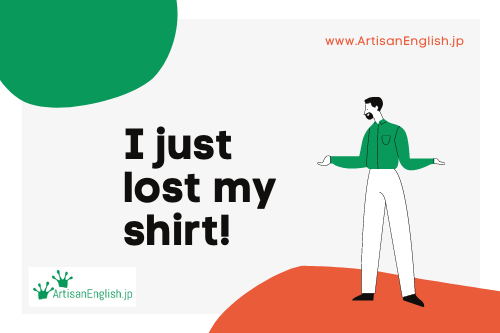
YouTube / iTunes / Spotify / Radio Public / Pocket Casts / Google Podcasts / Breaker / Overcast
Listen to ArtisanEnglish.jp posts & lesson intros here.
Idiom: Lose your shirt
Estimated reading time: 3 minutes
At first glance, you may look at this idiom and wonder how the heck someone can lose their shirt.
Of course, sometimes you can see a sad pair of shoes in a parking lot or a single, lonely shoe on the side of a road, but how often do you see a shirt?
Well, it’s an idiom, silly, so you don’t actually lose your shirt, you only lose your money, a lot of money, probably everything you had because you made an ill-advised bet and lost.
You’ll often hear this idiom used when someone talks about business deals or stock investments that have gone bad – very, very bad.
Although many restaurant owners haven’t made bad investments in their businesses, they are losing their shirts anyway due to the unforeseen business circumstances the pandemic has thrust upon them.
Companies exist for the sole purpose of making money.
Without customers, an eating establishment is no longer a business – it’s a liability.
Like or follow ArtisanEnglish.jp on social media.
Rent must be paid whether the owner earns income or not, and that’s the main reason why so many restauranteurs are losing their shirts right now.
No matter what you invest in, you can never know for sure whether you will make a killing or lose your shirt until you see how everything plays out.
The stock is a known gamble.
Have you heard about the short squeeze online investors forced on short-sellers of GameStop shares?
No, well, the drama played out two weeks ago when small, individual investors decided to teach the prominent fund managers a lesson.
Thousands of individuals purchased GameStop shares, driving up the price, which caused the huge players to lose their shirts.
It just goes to prove there are no guarantees when it comes to investing.
Flesch-Kincaid Readability Test
This post is understandable by someone with at least an 8th-grade education (age 13 – 14).
On the Flesch-Kincaid reading-ease test, this post scores 65.
The easier a passage is to read, the higher the score on a scale of 0 – 100.

